[bannerTop]
Welcome to our Jumbo Quiz “Virus” Pop-up removal guide. The following instructions will aid you in removing the unwanted software from your PC.
There are a lot of programs out there that despite usually not being harmful to your PC can still be quite annoying and therefore unwanted. One such program that we will be focusing on today is called Jumbo Quiz “Virus”. This one in particular, falls under the Browser Hijacker category. Software of this type is mainly known for it’s intrusive behavior and tendency to modify the user’s browsers (Chrome, IE, Edge, Firefox, etc.) by initiating seemingly random redirections, adding a new search engine or changing the homepage of the browser. Most Browser Hijackers tend to implement those changes without asking for permission from the user. Additionally, it is often impossible to bring your browser to its previous state without removing the nagging piece of software, since it would simply enforce them all over again. That is also why we have prepared a removal guide that has combined a number of different methods that would help you uninstall and fully remove Jumbo Quiz “Virus” from your machine, in order to prevent it from obstructing your normal browsing experience. The guide for that can be found below the current article, however, make sure to read the rest of the paragraphs in order to get a better grasp of what those Browser Hijackers exactly are and why you need to be careful around them.
Internet marketing and Browser Hijackers
The main reason why such programs are being developed in the first place is the rapidly growing online marketing industry. Generally speaking, Browser Hijackers are used as Internet promoting tools that are capable of generating considerable amounts of money for their creators by employing a number of advertising techniques. The problem with that is that those methods can oftentimes be quite aggressive and aggravating for the normal customer. Besides, most of the time, programs such as Jumbo Quiz do not have any helpful function that would make them worth keeping on your PC. Furthermore, even if they do actually possess some sort of valuable feature, it would certainly not be enough to make up for the intrusiveness and annoyance coming from the Hijacker.
Dangerous?
It is not difficult to see why applications of the Browser Hijacker type are often regarded as some form of malware. After all, they tend to mess with the user’s browser without permission, implementing unwanted changes and making them seemingly irreversible (at least, during the time the program remains active). However, though certain similarities do exist, Browser Hijackers cannot be compared to actual PC viruses such as Trojans and Ransomware. First of all, programs like Jumbo Quiz are usually quite harmless and do not try to attack your PC or mess with your personal data. Secondly, a lot of Browser Hijackers are legal pieces of software. None of this can be said regarding real online threats like the ones we mentioned above (Ransomware, Trojan horses, etc). Therefore, if you are currently dealing with a Browser Hijacker, there’s likely no reason to be worried or concerned and as long as you remain cautious around it and make sure to remove it ASAP, there shouldn’t be a problem.
Shady traits
In the previous paragraph we said that Jumbo Quiz is probably not a harmful program. However, we also said that you must be careful with it and make sure to remove it. This is because there are several potential issues that might come from a program of this type apart from the browser changes we already mentioned.
- Being online advertising tools, many Hijackers are known to fill the user’s browser with all sorts of obstructive and frustrating pop-ups and banners. Sometimes, they might even seem like something else (say, an error message) in order to trick the user into interacting with them. Our advice for you is to keep away from those ads.
- Some of those programs can look into your browser history to gain valuable data that is later used to modify their ads according to the user’s interests and preferences – this is a privacy violation!
- Another common issue caused by Hijackers is the slowing down of your PC’s productivity due to heavy usage of system resources by the processes of the unwanted program.
Stay safe!
One last thing that we need to cover before you go to the removal guide is how to protect your PC from Hijackers in the future. Here are several tips, which will help you boost your system’s security.
- Never allow your browser to automatically download files without first asking you for permission (you’d need to visit your browser settings).
- Watch out for any shady messages and spam e-mails since such are often used to spread unwanted software like Jumbo Quiz.
- Keep away from sites that appear sketchy and that have obscure content, and never use download sources that aren’t trustworthy.
- Get a reliable malware/adware removal tool to help you deal with undesirable programs.
- When installing new software, check the installation menu for added applications. If the program installer is actually a file bundle with apps added to it, make sure to leave out the ones that look sketchy and could be a Browser Hijacker or some other PUP (potentially unwanted program). If you cannot see the list of added content, use the Advanced/Custom installation menu.
Jumbo Quiz “Virus” Po-up Removal
I – Uninstallation
[bannerMiddle]
- Use the Winkey+R keyboard combination, write Control Panel in the search field and hit enter.

- Go to Uninstall a program under Programs.

- Seek the unwanted software, select it and then click on Uninstall
- If you are unable to spot Jumbo Quiz, search for any unrecognized programs that you do not remember installing on your PC – the unwanted software might disguise itself by going under a different name.
II – Safe mode and revealing hidden files
III – Cleaning all your browsers
- Go to your browser’s icon, right-click on it and select Properties.

- Go to the Shortcut tab and in the Target make sure to delete anything written after “.exe”.

- Now, open your browser and follow the instructions below depending on whether you are using Chrome, Mozilla or IE.
- Chrome users:
- Go to your browser’s main menu located in the top-right corner of the screen and select Settings.
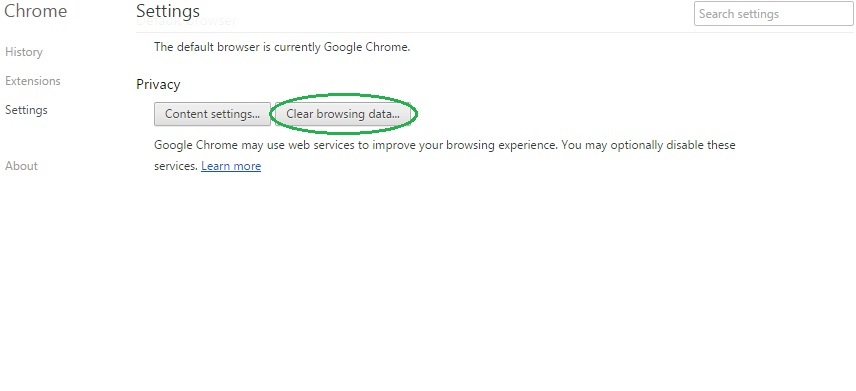
- Scroll down, click on Show Advanced Settings and then select Clear browsing data. Just to be sure, tick everything and clear the data.
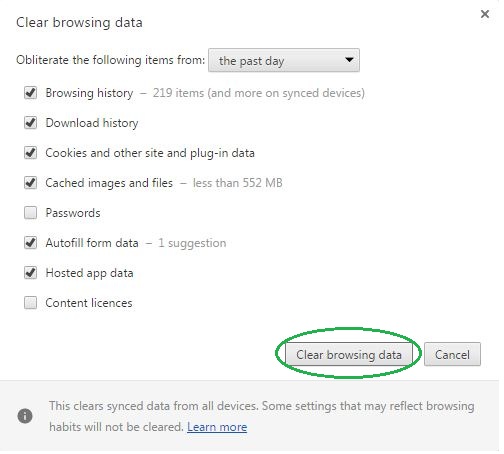
- Now, in the left pane, go to Extensions and look through all extensions that are integrated within your browser. If you notice any suspicious add-on, disable it and then remove it.
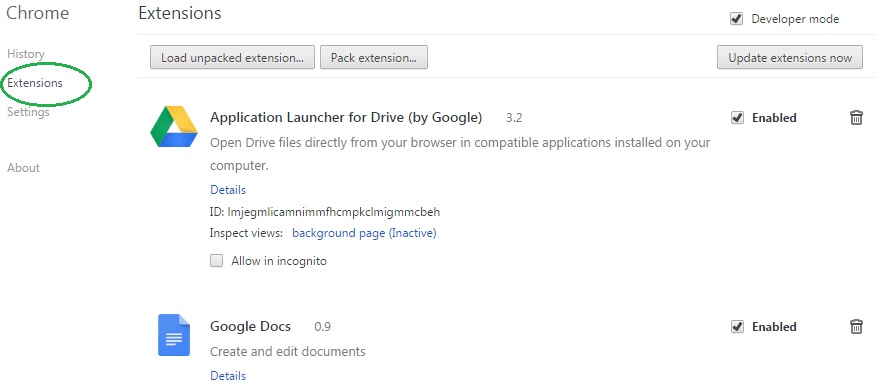
- Firefox users:
- Similarly to Chrome, go to the main menu and select Add-ons and then Extensions.
- Remove any suspicious browser extensions that you may have even if they do not have the name Jumbo Quiz on them.
- IE users:
- Go to Tools and select Manage add-ons.

- Click on all add-on types from the left pane and check if there is anything suspicious in the right panel. In case you find anything shade, make sure to remove it.
IV – Removing Shady processes
[bannerMiddleSecond]
- Go to your start menu, type Task Manager in the search field and from the results open View running processes with Task Manager.

- Thoroughly look through all processes. The name Jumbo Quiz might not be there, but if you notice any shady looking process that consumes high amounts of memory it might be ran by the unwanted program.
- If you spot the process ran by Jumbo Quiz, right-click on it, open its file location and delete everything in there. Then go back to the Task Manager and end the process.

V – DNS check
- In the start menu search box write View Network Connections and open the first result.
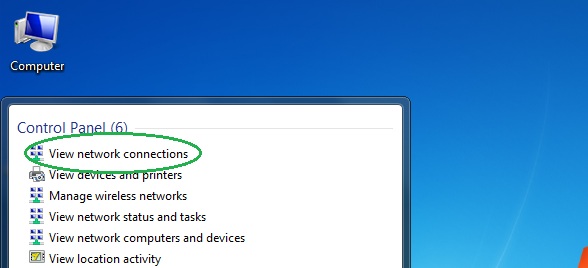
- Right-click on the network connection you are using and go to Properties.

- Select Internet Protocol Version (TCP/IPv4) and click on Properties.

- If Obtain DNS server addresses automatically is not checked, check it.
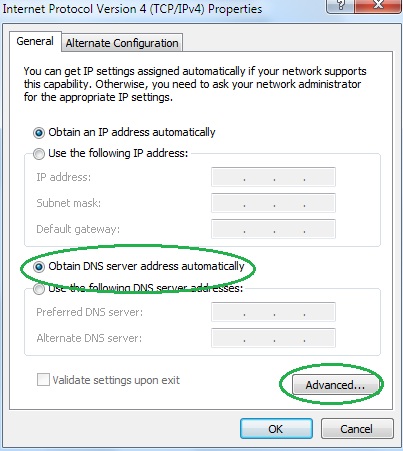
- Go to Advanced and select the DNS If there is anything in the DNS server addresses field, remove it and click OK.

- Click OK on the rest of the opened windows.